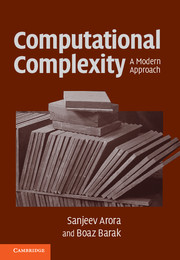Book contents
- Frontmatter
- Contents
- About this book
- Acknowledgments
- Introduction
- 0 Notational conventions
- PART ONE BASIC COMPLEXITY CLASSES
- PART TWO LOWER BOUNDS FOR CONCRETE COMPUTATIONAL MODELS
- PART THREE ADVANCED TOPICS
- Appendix: Mathematical background
- Hints and selected exercises
- Main theorems and definitions
- Bibliography
- Index
- Complexity class index
About this book
Published online by Cambridge University Press: 05 June 2012
- Frontmatter
- Contents
- About this book
- Acknowledgments
- Introduction
- 0 Notational conventions
- PART ONE BASIC COMPLEXITY CLASSES
- PART TWO LOWER BOUNDS FOR CONCRETE COMPUTATIONAL MODELS
- PART THREE ADVANCED TOPICS
- Appendix: Mathematical background
- Hints and selected exercises
- Main theorems and definitions
- Bibliography
- Index
- Complexity class index
Summary
Computational complexity theory has developed rapidly in the past three decades. The list of surprising and fundamental results proved since 1990 alone could fill a book: These include new probabilistic definitions of classical complexity classes (IP = PSPACE and the PCP theorems) and their implications for the field of approximation algorithms, Shor's algorithm to factor integers using a quantum computer, an understanding of why current approaches to the famous P versus NP will not be successful, a theory of derandomization and pseudorandomness based upon computational hardness, and beautiful constructions of pseudorandom objects such as extractors and expanders.
This book aims to describe such recent achievements of complexity theory in the context of more classical results. It is intendedto serve both as a textbook and as a reference for self-study. This means it must simultaneously cater to many audiences, and it is carefully designed with that goal in mind. We assume essentially no computational background and very minimal mathematical background, which we review in Appendix A. We have also provided a Web site for this book at http://www.cs.princeton.edu/theory/complexity with related auxiliary material, including detailed teaching plans for courses based on this book, a draft of all the book's chapters, andlinks to other online resources covering related topics. Throughout the book we explain the context in which a certain notion is useful, and why things are defined in a certain way. We also illustrate key definitions with examples.
Information
- Type
- Chapter
- Information
- Computational ComplexityA Modern Approach, pp. xiii - xviPublisher: Cambridge University PressPrint publication year: 2009
